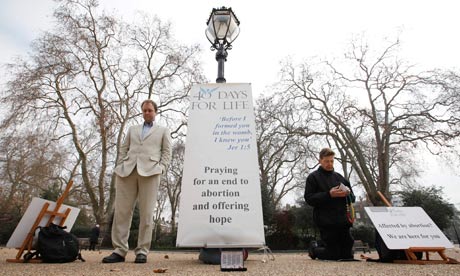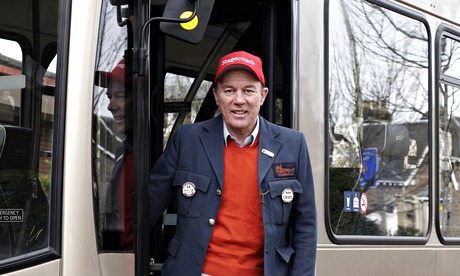Anti-abortion campaigners in Britain are making controversial claims that abortions are linked to an increased risk of breast cancer, in a presentation to children in school which has been obtained by the Guardian.
Pupils were told that abortion can cause infertility and result in the death of the mother, and were shown a video by a Christian campaigner from the US who calls for abortion to be made "unthinkable".
Conceiving a child after rape is the "ultimate unplanned pregnancy", but to have an abortion at this stage can be a "second trauma," children at a secondary school in Cambridgeshire were told.
"For some people who've been raped and had the baby, even if they don't keep it, something positive comes out of that whole rape experience," pupils aged 14 and 15 were told.
The presentation, by the Society for the Protection of Unborn Children, also refers to a teenage girl who died after an abortion and a young woman who committed suicide after aborting twins.
Britain's biggest abortion provider, the British Pregnancy Advisory Service, warned recently that it is facing "a new era" in anti-abortion protest after women were filmed arriving at and leaving its London clinic.
Pro-choice campaigners plan a counter-protest there next week.
The anti-abortion school presentation at the end of February is part of a series of talks the SPUC has given at schools and meetings of parents which challenge abortion and sex education. The group campaigns for a ban on what they describe as "explicit" sex education in schools.
The school presentation was disclosed to the Guardian by Feminist Action Cambridge, a local activist group that had been invited to give a talk at the school on the same day.
In reference to the children at Comberton village college being told that abortion could trigger breast cancer, the female representative of SPUC said: "The link with breast cancer is because if a woman has an abortion, particularly in her first pregnancy, changes have to take place in her breasts.
"If during that pregnancy she has an abortion … then it can leave those cells in the breasts in a kind of half-changed state and statistically, that increases her risk of developing breast cancer later on in life."
The SPUC representative added: "I'm not saying this is something that's going to happen to everybody."
A study co-ordinated by Cancer Research UK and published in the Lancet has shown that abortion does not increase the risk of breast cancer.
The SPUC talk took place as part of a discussion of medical ethics at the school, which also featured a "pro-choice" talk by the feminist group.
The SPUC representative claimed that after abortion some women experienced trauma which was "a form of post-traumatic stress disorder".
The children were shown two videos. One was a short film detailing the development of the foetus.
The second was a video message from a US anti-abortion campaigner, who says: "I believe with everything in me that women deserve better than abortion, and we cannot continue – whether it stays legal in a country or not, we need to make abortion unthinkable and unnecessary, because we know … that abortion hurts women."
The anti-abortion speaker mentioned two cases in which abortions were linked to the deaths of the mother. Referring to Manon Jones, an 18-year-old from Bristol who died in 2005, she said: "In rare cases women will die from having an abortion … Even in legal abortions women will die."
The inquest in the case heard Jones died because of delays giving her a blood transfusion. She went on holiday two weeks after the abortion, against medical advice.
Emma-Rose Cornwall, one of the feminist activists who attended the talk, said: "SPUC's supposed concern for zygotes is a poorly concealed desire to see women forced back into their 'god-given' roles as mothers and housewives, and simultaneously to punish what they perceive as promiscuous sexuality."
Cornwall said she and her fellow volunteer asked to sit in on the anti-abortion session as "we couldn't get a copy of their material through the school, because SPUC refused to provide any".
Michael Bigg, head of religion, philosophy and ethics at the school, said that a "range of speakers" had been invited in for the ethical discussion.
"By presenting the issues from a range of perspectives this enables students to be able to come to a balanced view of the topic and throughout the day we encourage everyone involved to question what is presented to them in order to develop their ideas," he said.
Andrew Copson, chief executive of the British Humanist Association, said: "It is deeply disturbing that anti-choice groups are so easily able to enter schools and present these damaging fictions. Parents and teachers should be aware of the falsehood of the claims made by SPUC, and the government should be more pro-active in preventing groups that persistently make false claims of this nature from having access to vulnerable children, especially in schools."
SPUC emailed the Guardian a briefing note which included the claim that: "a woman will have [a] higher breast cancer risk if she undergoes an abortion."
Referring to the school presentation, Anthony McCarthy, publications and education manager at the SPUC, said: "She appears, if the report is accurate, to have been discussing a theory which may possibly explain some of the correlations that have been observed between abortion and breast cancer. That would be by no means an endorsement of the view that x has been proven to cause y."
Extracts from the school talk
The 1967 Abortion Act
"What the [abortion] act did was effectively make unborn children a class of non-person. In other words, they didn't have a right to life."
Abortion and disability
"This was an act that gave greater rights to protect people with disabilities... and this is a good thing. But we have a strange situation where on the one hand we do everything we can to help people with disabilities after they're born but it is legal within the Abortion Act to do abortion for disability right up until the birth of the baby."
Women's reproductive rights
"There are certain things as a society we decide are unacceptable, we don't have a right to do. So for example, if somebody were to beat up an old lady, we wouldn't say that's their right to do that. I would say... I would say without the right to life all the other rights become irrelevant."











